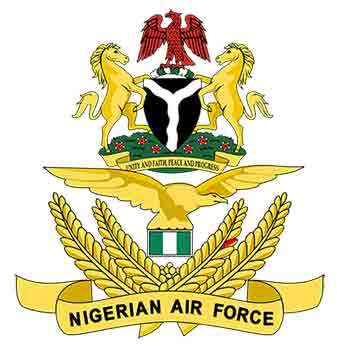The Nigerian Air Force is the air arm of the Armed Forces of the Federal Republic of Nigeria. It is one of the largest air forces in Africa with an estimated 16,000 personnel according to the CIA world factbook.
 The need for an air force to support the operations of the Nigerian armed services was highly necessitated during Nigeria’s participation in peacekeeping missions in Congo and Tanzania. During this foreign missions, Nigerian military solicited the help of foreign air forces to airlift Nigerian army troops to the theatre of operations.
The need for an air force to support the operations of the Nigerian armed services was highly necessitated during Nigeria’s participation in peacekeeping missions in Congo and Tanzania. During this foreign missions, Nigerian military solicited the help of foreign air forces to airlift Nigerian army troops to the theatre of operations.
The government in power recognized the urgent need for an air force actively supported by professional personnel and modern facilities. The federal government then agreed in principle that an air force should be established. The Nigerian parliament then approved the decision, leading to the establishment of the Nigerian Air Force and recruitment of cadets in June 1962.
The Nigerian Air Force has since developed greater fighting capabilities to curb terrorism in Nigeria.
Unlike most third world countries, Nigeria currently fields some high tech air platforms it utilizes for surgical strikes, intelligence gathering and general surveillance. Currently, the Nigerian air force has flown more sorties than any other nation in sub-Saharan Africa.
Being a former British colony and a member of the commonwealth, the Nigerian Air Force is modeled after the UK’s Royal Air force and strongly maintains its ranking system. Just like the Royal Air Force, the Nigerian Air Force officers are grouped into commissioned and non commissioned officers.
Being an officer of either of these two cadres determines the rank and salary structure of an officer. If you are enthusiastic about joining the navy or just a curious spectator, here’s a list of all Nigerian air force ranks and salary structure;
Monthly Basic Salary for Non-commissioned Ranks
- Air Warrant Officer: Earns ₦171,793 as monthly basic salary
- Master Warrant Officer: Earns ₦165,697 as monthly basic salary
- Warrant Officer: Earns ₦101,974 as monthly basic salary
- Flight Sergeant: Earns ₦87,119 as monthly basic salary
- Sergeant: Earns ₦69,261 as monthly basic salary
- Corporal: Earns ₦58,634 as monthly basic salary
- Lance Corporal: Earns ₦55,832 as monthly basic salary
- Aircraftman: Earns ₦53,892 as monthly basic salary
- Cadet /Trainee: Earns ₦44,564 as monthly basic salary
Monthly Basic Salary for Commissioned Ranks
- Air Chief Marshal: Earns ₦1,724,283 as monthly basic salary
- Air Marshal: Earns ₦1,486,451 as monthly basic salary
- Air Vice Marshal: Earns ₦1,376,343 as monthly basic salary
- Air Commodore: Earns ₦677,895 as monthly basic salary
- Group Captain: Earns ₦352,631 as monthly basic salary
- Wing Commander: Earns ₦342,586 as monthly basic salary
- Squadron Leader: Earns ₦248,004 as monthly basic salary
- Flight Lieutenant: Earns ₦232,484 as monthly basic salary
- Flying Officer: Earns ₦218,400 as monthly basic salary
- Pilot Officer: Earns ₦187,159 as monthly basic salary
Commissioned officers are usually officers in management positions and are mostly responsible for assigning missions to non commissioned officers. Commissioned officers usually enjoy better basic pay and bonus packages than their non commissioned counterparts. Conversely, non-commissioned officers are paid less and make up most of the fighting force responsible for carrying out any mission.
Apart from the basic monthly salary, Nigerian Air Force officers are also eligible for operational allowances and other seasonal bonuses as prescribed by the Nigerian Military leadership.
Notable achievements and functions of Nigerian Air force
Since its formation in the 1960s, the Nigerian air force has made a series of notable contributions to the Nigerian Armed Forces.
- The force has contributed immensely to the goal of maintaining peace within an outside Nigeria.
- Its services have also been critical in the ongoing war against Boko Haram.
- On the international scene, the Nigerian air force was pivotal in the restoration of political stability in war-torn Liberia during its bloody civil war. In 1990, two rebel groups, the National Patriotic Liberation Front led by Charles Taylor and a splinter group called the Independent NPLF descended on Liberia heading towards the capital in a killing spree. The Nigerian air force halted their advance and responded by series of aerial bombardment of the advancing rebels.
- Two years later in 1992, after series of failed peace talks, Charles Taylor launched a second murderous assault on the capital Monrovia. This time, backed by the Nigerian army, the Nigerian air force responded by flying thousands of mission, dropping tons of Beluga cluster bombs.
- Sooner than later, the civil war in Liberia spilled into weakly-governed Sierra Leone. The air Nigerian air force once again played a pivotal in totally annihilating most rebel contingents.
- All together the air force has been engaged in about four African conflicts including the war in northern Mali and the invasion of Gambia.



